Graham Reid | | 3 min read
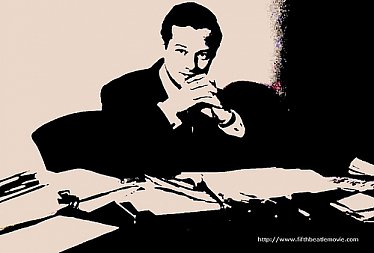
When Brian Epstein died in August 1967 at the age of 32, he was one of the most famous men in Britain. His death by an accidental overdose of prescription drugs made the front page of newspapers at home and abroad.
Yet a mere five years earlier Epstein was known only to a few close friends and family in his native Liverpool where he managed a popular record shop as part of the family furniture business.
How Epstein, an intelligent, immaculately groomed, gay Jewish man with aspirations to a career in fashion or acting, came to international renown can be encapsulated in two words: the Beatles. 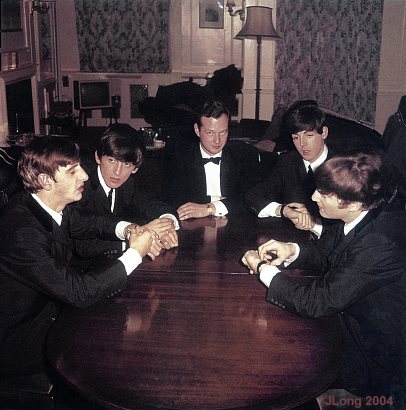
More by accident than design Epstein became their manager when he started stocking and selling out of their first single, My Bonnie, recorded in Germany.
The group was playing in the Cavern, a club a few minutes' walk from his music store.
He saw potential in their natural, working-class humour and driving beat music (and fancied John Lennon for his rough demeanor) so took them out of their passé leather gear, put them in suits and, by unwavering faith and diligence, eventually secured them a record deal with one of the smallest labels in Britain in mid-62.
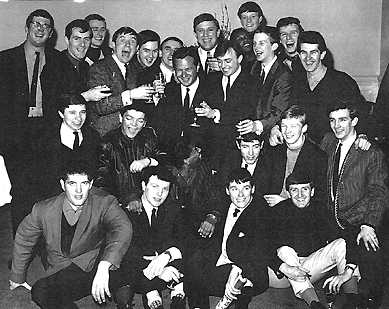 During the following three years his stable of acts grew to encompass Gerry and the Pacemakers, Cilla Black, the woefullt unsuccessful Tommy Quickly, Billy J. Kramer and many others.
During the following three years his stable of acts grew to encompass Gerry and the Pacemakers, Cilla Black, the woefullt unsuccessful Tommy Quickly, Billy J. Kramer and many others.
In 1963 Epstein's acts commanded the top spot on the British charts for an extraordinary 37 weeks.
His ghost-written autobiography A Cellarful of Noise (which avoided mentioning his sexual orientation but fed some useful myths about the Beatles) was a best-seller. Some cruelly referred to it as A Cellarful of Boys.
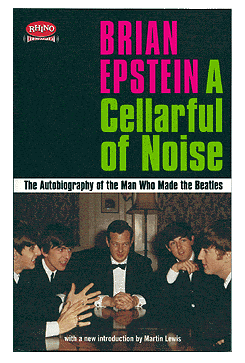 Epstein's remarkable trajectory into the spotlight, which he most often modestly avoided, is told in the BBC Arena documentary The Brian Epstein Story which draws a fine portrait of Epstein by using period footage and interviews, contemporary interviews with Paul McCartney (the only Beatle involved), Marianne Faithfull, a chubby Gerry (Pacemaker) Marsden, a lean and worn Billy J. Kramer and other managers and business associates and people of the period. There is also a moving account of his private life by his housekeeper, Lonnie Trimble.
Epstein's remarkable trajectory into the spotlight, which he most often modestly avoided, is told in the BBC Arena documentary The Brian Epstein Story which draws a fine portrait of Epstein by using period footage and interviews, contemporary interviews with Paul McCartney (the only Beatle involved), Marianne Faithfull, a chubby Gerry (Pacemaker) Marsden, a lean and worn Billy J. Kramer and other managers and business associates and people of the period. There is also a moving account of his private life by his housekeeper, Lonnie Trimble.
The documentary shows that behind the facade of grooming and sophistication, Epstein was often deeply unhappy.
As a gay man in Britain in the early Sixties -- and the documentary doesn't quite remind us how conservative that world really was outside artistic circles -- he was forced to moderate his lifestyle and live in secrecy.
He had also been a serial failure until he met the Beatles. His aspirations of being a dress designer had been scotched by his father, he attended the Royal Academy of Dramatic Arts in London but left after a year, and the Army, which called him for National Service considered him a compulsive civilian.
The Beatles, whom he genuinely loved and of whom he was an unabashed fan, saved him from life in the provinces.
Yes, McCartney and others concede he might not have been the most astute businessman (he signed away millions), but Epstein and the Beatles were breaking new ground and there were no guidelines on the marketing of merchandise as there are today.
As Ringo Starr told Larry King in '98: "He was very good. He started like we did. He didn't know the game, neither did we, really. We knew how to play, and he tidied us up and moved us on. He ran a record division in his father's furniture company, heard about us, or heard about them, I wasn't even with them then, went down to the Cavern, and said, hmm, maybe I'll manage them.
"He didn't know how to manage to save his life, but he decided to be a manager, so who knew?"
It's telling that after his death the Beatles' career was rudderless. The debacle of the Magical Mystery Tour film -- McCartney's idea to keep the band together and doing something creative when their energies were distracted by personal life and weariness -- and the founding and failure of Apple would perhaps never have happened under the stewardship of Epstein, who liked things under control.
The Brian Epstein Story is perhaps overlong for casual viewers, and it only tangentially mentions Epstein's unhappy predilection for rough-trade, for which he paid the price in the occasional beating and blackmail threat.
But as portrait of a cool, assured-looking man who went about his public business with grace and charm while all the world was seemed to be losing its head, it is intelligent and considered.
And it has a pretty good soundtrack to boot.


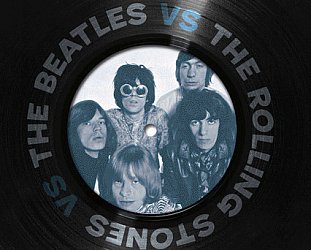




post a comment